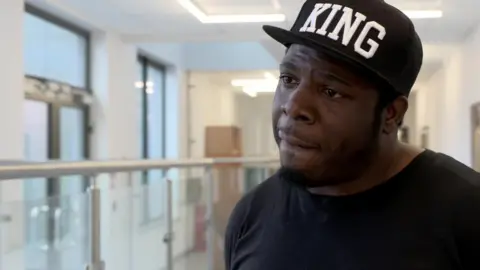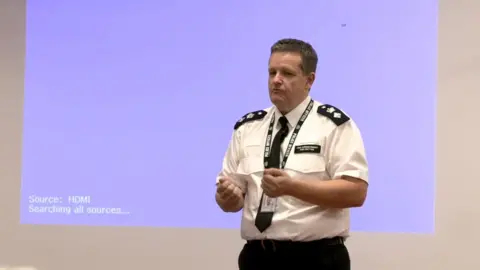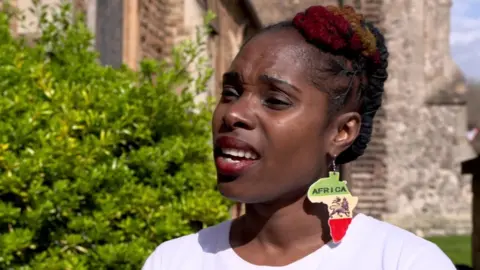Anger, disgust at Met but is there a positive future?
 BBC
BBC"Please don't give up on us," pleads a senior Metropolitan Police officer to a crowd of despondent community leaders in south London, following publication of a damning review of the force.
The long road to restoring the trust of Londoners, after successive scandals that have rocked the Met Police, is beginning.
Baroness Louise Casey's report found the force to be an institutionally racist, homophobic and misogynistic organisation where a "boys' club" culture ruled, and that the force was failing women and children, with public confidence shattered.
It also concluded the Met was unable to police itself, was at risk of being dismantled, and warned more officers like murderer Wayne Couzens and serial rapist David Carrick could exist.
The force's chief, Commissioner Sir Mark Rowley, says there must be "a new beginning".
In this community hub in Croydon, work is already under way.
The group behind the meeting, Croydon Voluntary Action (CVA), already works alongside Met officers to try to reduce violence in the area.
The community leaders here are listening intently as senior Met Police officer Ch Supt Andy Brittain tells them that, "working together, the police and the community, there will be potholes in the road, and they've come quite hard and fast.
"Going back to Wayne Couzens and the murder of Sarah Everard, these are big events that shape trust and confidence."
For local activist Anthony King, who is at the meeting, the Casey Report reaffirms what he already knew.
"I was so appalled by the information and content of the report, it was disgusting to read," he says.
"As a community, we've been saying this for 30-35 years, from the Scarman [report] to McPherson [report] until now, we felt things have not changed."
Despite his feeling of an absence of progress, Mr King believes a more positive future is approaching.
"I'm also confident because we have had a lot of engagement with Sir Mark Rowley," he added.
'Need to be allies with Sir Mark'
"I'm very much behind him, very much supportive that he will turn things around.
"And I feel like, as a community, we need to be allies with Sir Mark and see a change in our Met Police."
After addressing the crowd, Ch Supt Brittain admits: "It's been a really draining and emotional time.

"Not only are we having to deal with upset people within the organisation [the Met Police], we're also having to go out and talk to our communities. We focus so hard on rebuilding trust."
He says having that trust of the community is vital to helping keep Croydon's streets safe.
"We've had some real challenges, and we've put so much effort into building long-term relationships that will help us come together and deal with the issues that matter to most Londoners, keeping everyone safe."
In 2022, trust in the Met among Londoners fell to the lowest in recorded history. This statistic among black people was only 55% in December.
Sir Mark has said the force's relationship with the black community is "amongst the worst, if not the worst" and that stop and search in its present form "burns through trust" between police and the community.
He wants the force to be "more precise" in its use, and to consult with communities.
'See the Met as human'
Councillor Tamar Barrett, founder of the domestic abuse support group The Lioness Circle, says the work of the Croydon project and connecting with members of the Met has shifted her perception of the police.

"There was a time before when bringing the community together with the Met was never even a thing," she says.
"I see some awesome, amazing individuals within the Met that I have connected with human-to-human.
"Bringing that into the space [community] is important, so predominantly victims from the African and Caribbean heritage can see the Met as human themselves as well.
"Rather than the image that so many of us have seen them with for so long."

Analysis: 'Frustration and fatigue from some Londoners'
By BBC London home affairs correspondent Sonja Jessup
The Met Commissioner Sir Mark Rowley has appealed to Londoners - and his own police officers and staff - to "stick with us". But he knows that's a tough ask.
Rooting out abusive or corrupt police is an ugly process: every officer who's sacked or convicted of crime generates new headlines, which can further damage trust.
The findings of the Casey review, while shocking, were also met with frustration and fatigue from some Londoners.
They hear those promises of change and say they've been here many times before.
And although the commissioner has accepted the failings identified by the report, his refusal to use the term "institutional" is still causing concern for some, who fear it's yet more defensiveness and denial.
Sir Mark Rowley says that improvements will come, over the weeks and months ahead.
Ultimately, Londoners will judge him on whether they feel safer in their communities, confident to report crime, and that police will take action.

Follow BBC London on Facebook, Twitter and Instagram. Send your story ideas to [email protected]
